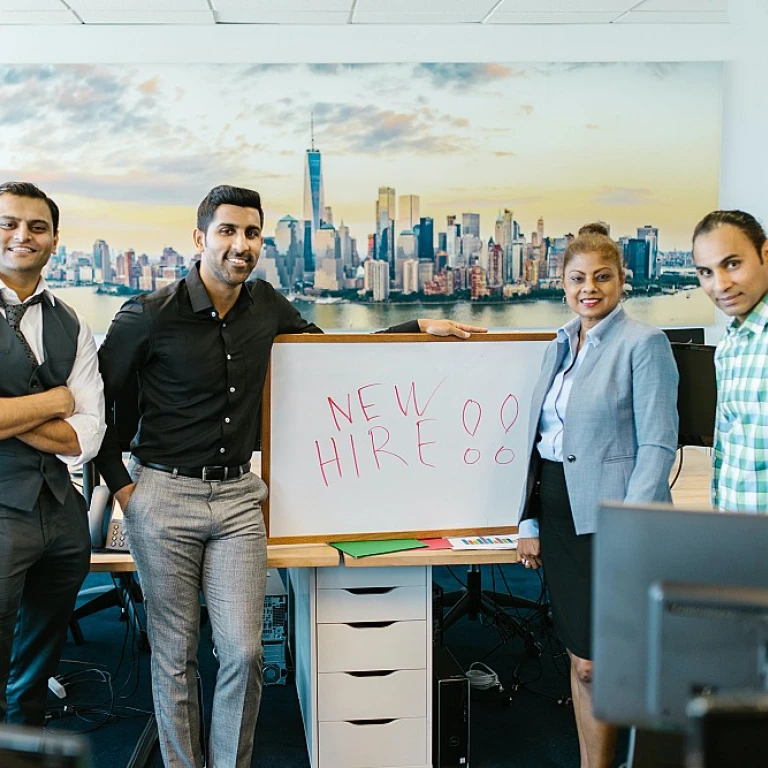Understanding the Motivation Behind a Midlife Career Change
Finding Reasons Behind a Late-Career Shift
Making a career change in your 50s is more common than you might think, and understanding your motivation is key to making a successful transition. Many people in this age bracket find themselves yearning for meaningful work, looking for jobs that resonate with their passions rather than just paying the bills. Some might have personal reasons, like wanting more free time for family or deciding to pursue a long-forgotten dream. It's essential to take a step back and assess what’s driving you to change careers. For some, it's about developing new skills or wanting to make a positive impact on others. For others, it's about gaining fulfillment that wasn't present in their previous roles. According to a survey conducted by the AARP, many older workers are still eager to grow and find shareholder value in stocks beyond monetary compensation, often seeking roles that offer a sense of purpose. Whatever your personal story might be, identifying your motivation can help clarify your career path. Carefully reflecting on why you want to change careers will also guide you in determining the skills you’ll need to succeed in a new job and how other parts of your life might also be affected. As you navigate this new chapter, balance is vital. Change should be strategic, considering both your existing experience and what you are looking for in your "second act." Don't underestimate your strengths – transferable skills accumulated over years can be a massive asset in new roles and can make the daunting process a lot smoother. If you're worried about starting over, remember that many have successfully transitioned, and seeking guidance from a career coach or mentor can be invaluable. Personal stories from those who have made similar changes can be encouraging and offer important insights. If you're contemplating a shift, examine articles by experts who have assessed various age-related dynamics in career changes. Navigating a career shift in your 30s also provides valuable insights that could be adapted to your life situation, even if you're a few decades beyond.Assessing Your Skills and Experience
Evaluating Your Toolbox
When considering changing careers after many years on a single path, it's important to understand what you're bringing with you from past jobs. Take time to reflect on your work life thus far. What things have you done that others have praised? What tasks have you done that turned out successfully? List both the skills that you've mastered and those you're keen to strengthen. As seasoned as you may be, there's always room for fresh training. Think about any entry-level skills or tasks you’ve used in past years. These might include communication, leadership, or project management skills. If you're pondering entering a new field like real estate or tech, don't discount related experiences.Learning the New Ropes
In your 50s, you may feel like you're catching up with working peers who grew up with the digital age. Distance learning and online training are now at your fingertips and can be a fantastic help in bridging the skills gap. The key is to build self-confidence and remain curious. Some people, such as career coaches, champion taking short courses or attending workshops that mirror your desired job field. They suggest focusing on transferable skills as older workers often possess vast amounts of know-how that makes learning new things feasible. Once you've determined which skills to bolster, consider the quality of training. Real life training scenarios can prove pivotal in showing prospective employers that you can contribute meaningfully even in new jobs.Age: Not Just a Number
Indeed, age can spin both ways. To some, your years represent a vast experience base. However, age-related stereotypes can rear their ugly heads, especially during job interviews. Instead of squirming about this, it’s better to tackle it directly. Focus on your strengths and what you bring to the table due to your unique experiences. You have decades of character-building experiences. Journals like Forbes often outline how employers value life's experiences slightly older candidates bring, sometimes even more than technical skills they might lack. If you're serious about changing careers, remind yourself that skills fade; life's lessons don't. Change your mindset to see age as an advantage rather than a hurdle. In the end, it’s all about being confident in who you are and knowing that’s your edge. Reimagining your career path at 50 opens doors to new opportunities, lifelong learning, and the chance to redefine what working means to you at this stage of life.Overcoming Age-Related Stereotypes
Breaking Through Age-Related Barriers
Changing careers in your 50s comes with its own set of challenges, and battling stereotypes can be one of the toughest parts. But the idea that older workers struggle to adapt is a misconception that many have defied. Let me share a few key steps to help you break through these barriers and on to the path of your next big job. First, remember the treasure trove of skills and experience you've amassed over the years. This isn't the 1950s any longer – employers today value what you bring to the table more than ever. According to the AARP, workers aged 50 plus contribute valuable life skills and business savvy that can lead to both successful and rewarding employment. Next, consider the language you use when discussing your career change. Make sure you highlight your skills as adaptable, innovative, and results-driven in your resume and interviews. Describe how your time-tested capabilities will drive success in your new role. Being confident and assertive about your strengths helps you stand out in any crowd. It's also smart to update your skills, if necessary, through courses or training. Whether it's learning new tech or refreshing older skills, there's plenty you can do without the full-time classroom commitment. Distance learning options are more plentiful than ever, making skill enhancement accessible and convenient no matter where you are. Think about other inspiring stories that have come before you. Colonel Harland Sanders' well-known chicken empire started when he was well into his 60s. Or, take a leaf from the book of Carole Ann Boone, who at age 56, transitioned from a high-flying marketing executive to fulfilling her passion for real estate, becoming a successful property consultant. If you’re encountering hesitation or are unsure where to begin, a career coach can provide personalized guidance, helping to boost your confidence in navigating these changes. Don't let age stereotypes stop you from pursuing your passions and goals. Combatting these myths head-on means clearing the way for a fulfilling career change. So what are you waiting for? Check out this guide on conquering the fear of a career change for more tips on getting your new professional life off the ground: Conquering the Fear of Changing Your Career. Stay positive, embrace your experience and take the first step to change your career. There's no such thing as too late when it comes to following your dreams.Exploring New Career Paths and Opportunities
Discovering Fresh Avenues and Opportunities
So, you're at this pivotal crossroad in your 50s, searching for new ventures in work life. It's an exciting time, trust me! As you contemplate changing careers, let's zero in on the numerous paths and job opportunities that await you. As many have found, this phase of life offers a chance to craft a meaningful second act. Real estate, consulting, coaching, or even diving into the gig economy can be worthwhile pursuits.- Real Estate: Leveraging your vast experience, entry-level real estate roles can develop into rewarding careers. It's a flexible field where your previous skills and people savvy can shine.
- Consulting and Coaching: A rich work history can be your biggest asset. Consider offering consulting services in your former industry or becoming a career coach to guide others through their professional transitions.
- Gig Economy: Platforms offering part-time or freelance work can be a testing ground for discovering jobs that match your passions and strengths.
Building a Strong Professional Network
Expanding Your Circle
Building a strong professional network is more than just collecting business cards or LinkedIn connections. It's about fostering genuine relationships with people who can offer insights, guidance, and support as you change your career. Remember, it's never too late to make new connections, even if you're considering a career shift in your 50s.Leverage Your Existing Network
Start with the people you already know. Reconnect with former colleagues, classmates, or industry peers. They can provide valuable advice or introduce you to others in your desired field. A simple catch-up over coffee or a virtual chat can open doors you never imagined.Join Professional Groups
Consider joining professional organizations or attending industry events related to your new career path. These gatherings are excellent for meeting people who share your interests and can offer guidance. Online forums and social media groups can also be beneficial, especially if you're exploring entry-level positions or new career paths.Seek Out Mentorship
Finding a mentor can be a game-changer. Look for someone who has experience in the field you're interested in. They can provide personalized advice and help you avoid common pitfalls. Don't hesitate to reach out to potential mentors with a sincere message about why you admire their work and how their experience aligns with your goals.Volunteer and Give Back
Volunteering is a great way to meet new people while gaining relevant experience. It allows you to showcase your skills and work ethic in a real-world setting. Plus, it can be incredibly rewarding to contribute to a cause you care about while you're in the midst of changing careers.Stay Open and Curious
Networking isn't just about what others can do for you. It's also about what you can offer. Share your own experiences and insights. You never know when your story might inspire someone else or lead to unexpected opportunities. In the end, building a strong professional network takes time and effort, but it's an investment that will pay off as you transition into a new career. Remember, every connection is a potential opportunity to learn and grow in your professional life.Crafting an Effective Job Search Strategy
Making Your Job Search Work for You
Embarking on a career change in your 50s can feel like a big leap, but with the right job search strategy, you can make the transition smoother. Here's how to get started:
Highlight Your Strengths and Experience
First things first, your resume is your ticket to new opportunities. Make sure it showcases your skills and experience. Tailor it to highlight transferable skills that can be applied to your new career path. Remember, your years of experience are a valuable asset, not a hindrance.
Leverage Your Network
Your professional network is a goldmine for finding new job opportunities. Reach out to former colleagues, mentors, and friends who can provide insights or referrals. Networking isn't just about finding a job; it's about building relationships that can support you throughout your career change.
Consider Distance Learning and Training
Don't shy away from learning new skills. Distance learning courses and training programs can help you gain the knowledge needed for your new career. Whether you're eyeing a role in real estate or diving into a tech job, continuous learning will keep you competitive.
Be Open to Entry-Level Positions
Changing careers might mean starting from scratch. Be open to entry-level positions that allow you to get your foot in the door. These roles can provide valuable experience and help you climb the ladder in your new field.
Stay Positive and Persistent
Changing careers at any age requires patience and persistence. Don't get discouraged by setbacks. Stay positive and keep pushing forward. Remember, many older workers have successfully transitioned into new careers, proving it's never too late to chase your dreams.
With the right strategy, changing careers in your 50s can lead to a fulfilling and rewarding professional life. Take the time to assess your current skills, explore new opportunities, and build a network that will support your journey. Your next great job is out there waiting for you.




